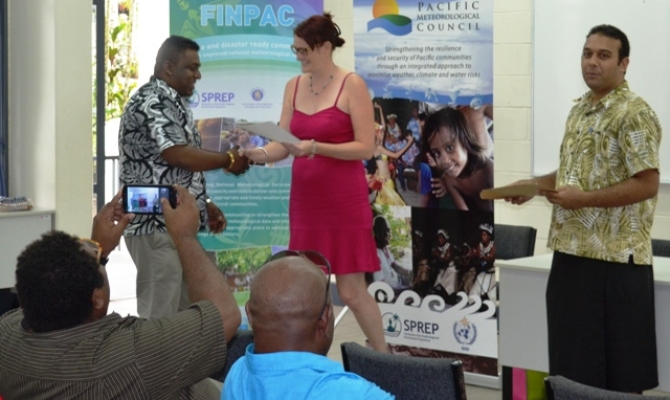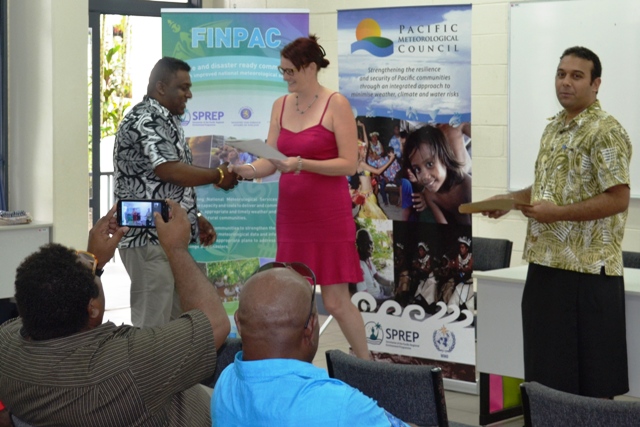
Climate Change Resilience
National meteorological services in five Pacific countries are soon to install a tool designed to improve weather forecasting services. The SmartMet system will help met services collate, view, analyse and interpret weather data and at the same time compose, edit, disseminate and archive weather forecasts in graphical and text formats
Samoa, Solomon Islands, Tonga, Papua New Guinea and Fiji will be working with SmartMet and this week in Samoa, Met officers are undergoing training that will equip them with the skills to allow them to better utilise SmartMet.
Led by the Information Technology team at the Secretariat of the Pacific Regional Environment Programme (SPREP), over the period of a week, the participants have learnt about operating systems, systems administration and how to operate web pages. All of which will see them become more confident in using SmartMet.

"Right from day one until now, this training has been helpful, I think this should be compulsory for every weather forecaster," said Mr Moleni Tu'uholoaki, Head of the Forecast and Warning secion of the Tonga Meteorological Service.
"Our SmartMet system will be installed in September this year, we've learnt so much from this training, we know how to look after and sustain our servers, build websites and script our weather forecasts. Now we are more than ready to start working on the SmartMet System, we look forward to it."
The SmartMet systems have been funded through the Finnish-Pacific Project (FINPAC) which focuses on reducing vulnerability of Pacific island country villagers' livelihoods to the effects of climate change. It is a four year project funded by the Ministry of Foreign Affairs of Finland through a grant to the Secretariat of the Pacific Regional Environment Programme (SPREP) and the Finnish Meteorological Institute (FMI).
"A recent study conducted by our partners in the region showed that from 1982 to 2012, of the 615 natural hazards recorded during that period in the Pacific, 75% of those disasters are weather related. Tropical cyclones contribute to over 50% of the weather related disasters," said Ms. Alofa S. Tuuau Officer in Charge of SPREP, at the start of the workshop this week.
"And because of this, the Pacific is known to be one of the most natural hazard-prone areas on earth. You play a very critical role in ensuring the safety of our communities in the region."
The workshop was held from 4 – 8 August at the SPREP Compound. It was attended by participants from Samoa, Solomon Islands, Tonga, Papua New Guinea and Fiji.
Samoa, Solomon Islands, Tonga, Papua New Guinea and Fiji will be working with SmartMet and this week in Samoa, Met officers are undergoing training that will equip them with the skills to allow them to better utilise SmartMet.
Led by the Information Technology team at the Secretariat of the Pacific Regional Environment Programme (SPREP), over the period of a week, the participants have learnt about operating systems, systems administration and how to operate web pages. All of which will see them become more confident in using SmartMet.

"Right from day one until now, this training has been helpful, I think this should be compulsory for every weather forecaster," said Mr Moleni Tu'uholoaki, Head of the Forecast and Warning secion of the Tonga Meteorological Service.
"Our SmartMet system will be installed in September this year, we've learnt so much from this training, we know how to look after and sustain our servers, build websites and script our weather forecasts. Now we are more than ready to start working on the SmartMet System, we look forward to it."
The SmartMet systems have been funded through the Finnish-Pacific Project (FINPAC) which focuses on reducing vulnerability of Pacific island country villagers' livelihoods to the effects of climate change. It is a four year project funded by the Ministry of Foreign Affairs of Finland through a grant to the Secretariat of the Pacific Regional Environment Programme (SPREP) and the Finnish Meteorological Institute (FMI).
"A recent study conducted by our partners in the region showed that from 1982 to 2012, of the 615 natural hazards recorded during that period in the Pacific, 75% of those disasters are weather related. Tropical cyclones contribute to over 50% of the weather related disasters," said Ms. Alofa S. Tuuau Officer in Charge of SPREP, at the start of the workshop this week.
"And because of this, the Pacific is known to be one of the most natural hazard-prone areas on earth. You play a very critical role in ensuring the safety of our communities in the region."
The workshop was held from 4 – 8 August at the SPREP Compound. It was attended by participants from Samoa, Solomon Islands, Tonga, Papua New Guinea and Fiji.